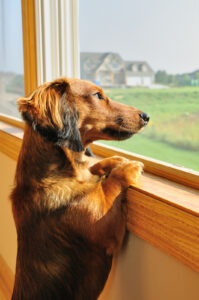Barks Blog
Home Alone: The Painful Puzzle
By Terrie Hayward

Separation anxiety in a dog is the “equivalent of a full-blown panic attack in a human being due to the anxiety and fear of being left alone. The severity of the panic attack and the way each dog manifests and displays it may be different, but the physiological basics are the same. Fear and anxiety are best friends, and the hormonal and neuro-chemical processes that happen when these emotions are triggered are not under simple mind control, certainly not by dogs (and generally not by humans, either).” (DeMartini-Price, 2014)…Dogs may appear anxious or depressed prior to their guardians leaving and/or when certain cues signify that a departure is imminent. Separation anxiety may appear as though a dog is severely anxious. The dog might vocalize (bark, whine, howl), self-mutilate (excessive self-licking or biting or chewing of fur or appendages), tremble or shake off (as if he were soaking wet), yawn, pace, spin, urinate or defecate, or be destructive in the home (often being self-injurious in an attempt to break out of crates, or get through doorways) and damage walls, furniture, or small items in the house. Dogs with separation anxiety may also display what is known as anorexia, whereby the dog is unable to eat while alone, even when favorite treats are presented. Read more

